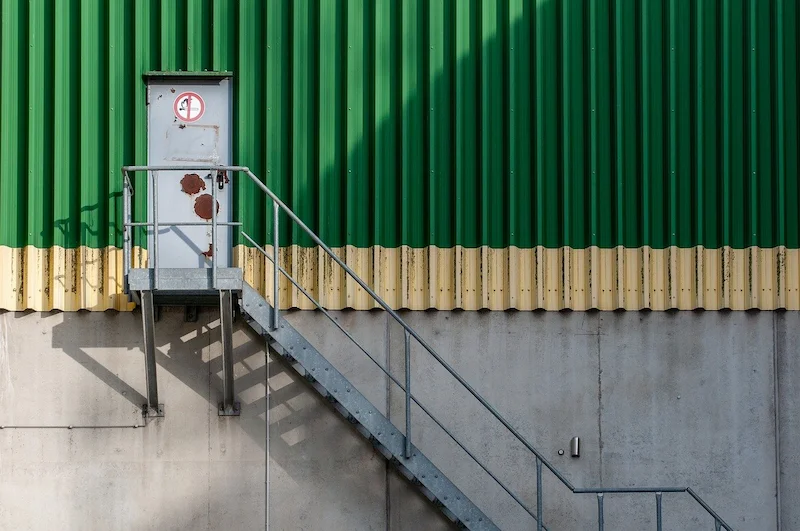Table of Contents
Selecting the right stair units for an industrial facility is not only important for functionality but also critical for safety and efficiency. Industrial environments require durable, high-performance stair systems that can withstand harsh conditions while ensuring smooth operational flow. Making the right choice involves understanding your specific needs, the types of stair units available, and various other factors such as materials, compliance with regulations, and customization options. Below, we explore the most important considerations to help you make an informed decision.
Assess Your Operational Environment
Before choosing the right stair units, assess the specific demands of your industrial environment. Consider the types of activities taking place, the frequency of stair use, and the nature of the materials or equipment that workers may be carrying up and down the stairs. For instance, in facilities where heavy machinery is operated, the stair units need to be extremely robust, resistant to corrosion, and capable of handling significant weight loads. In contrast, in environments where cleanliness is a priority, such as food processing or pharmaceutical production, the stairs should be easy to clean and maintain.
Additionally, consider environmental conditions like exposure to chemicals, humidity, or outdoor elements. For outdoor use, stair units should be built to withstand rain, snow, and other weather-related stressors. These environmental factors will help you narrow down your options and ensure that your stair units perform effectively without frequent repairs or replacements.
Know Your Stair Types
Understanding the various types of industrial stair units available is crucial to making the right selection. According to www.erectastep.com experts, there are metal stairs, rolling stairs and platforms, ship ladders, commercial stairs, and portable stairs. Each type serves different purposes depending on the environment and usage requirements. Metal stairs are ideal for heavy-duty, permanent installations where high durability is required. Rolling stairs and platforms offer flexibility for facilities where mobility is needed, such as warehouses or manufacturing plants that require frequent rearrangement of equipment. Ship ladders are steep and take up less space, making them suitable for tight or confined spaces, while commercial stairs are designed to handle moderate foot traffic in business or light industrial settings. Portable stairs offer easy assembly and disassembly, making them useful in temporary or evolving workspaces. Knowing these categories will help you match your facility’s specific demands to the right solution.
Consider Materials and Durability
The materials used in industrial stair units play a significant role in both durability and safety. Common materials include steel, aluminum, and stainless steel. Steel stairs are known for their strength and long lifespan, making them suitable for heavy-duty industrial environments. They are highly resistant to wear and tear and can support substantial loads, which makes them perfect for applications involving machinery or heavy equipment.
Aluminum stairs, on the other hand, are lightweight and resistant to corrosion, making them ideal for outdoor or moisture-prone environments. Stainless steel offers an excellent balance of strength and corrosion resistance, particularly in environments where hygiene is important, such as food and beverage production. Selecting the right material ensures that your stair units are resilient and able to meet the specific challenges of your facility.
Safety and Compliance with Regulations
Safety is paramount in industrial settings, and stair units are no exception. Not only should the stairs themselves be designed with safety features like slip-resistant surfaces and handrails, but they must also comply with local and national safety regulations. These standards are typically governed by organizations such as the Occupational Safety and Health Administration (OSHA) or the International Building Code (IBC), which set strict requirements for tread depth, riser height, and railing specifications.
Customization and Flexibility

Industrial stair units are not a one-size-fits-all solution. Depending on the layout of your facility, the height of your platforms, and the specific tasks that will be performed, you may need customized stair units. Many manufacturers offer stair units that can be tailored to fit specific dimensions or special needs, such as modular stairs that allow for easy adjustments as your operational requirements evolve.
Evaluate Cost vs. Long-Term Value
Cost is always an important factor, but it should be weighed against long-term value. Cheaper stair units may seem like a good deal initially, but if they require frequent repairs, maintenance, or replacement, their total cost of ownership can quickly escalate. On the other hand, investing in high-quality, durable stair units can save you money in the long run by reducing the need for repairs and minimizing downtime due to maintenance.
Choosing the right stair units for your industrial needs involves careful consideration of various factors, including your operational environment, the types of stairs available, material durability, safety regulations, customization options, and cost-effectiveness. By thoroughly assessing these elements, you ensure that your stair units provide both immediate functionality and long-term value. Making the right investment not only boosts efficiency but also promotes safety and compliance in your industrial facility.
Want to explore something different? 6 Tips for Making Commercial Building Repairs Easier

